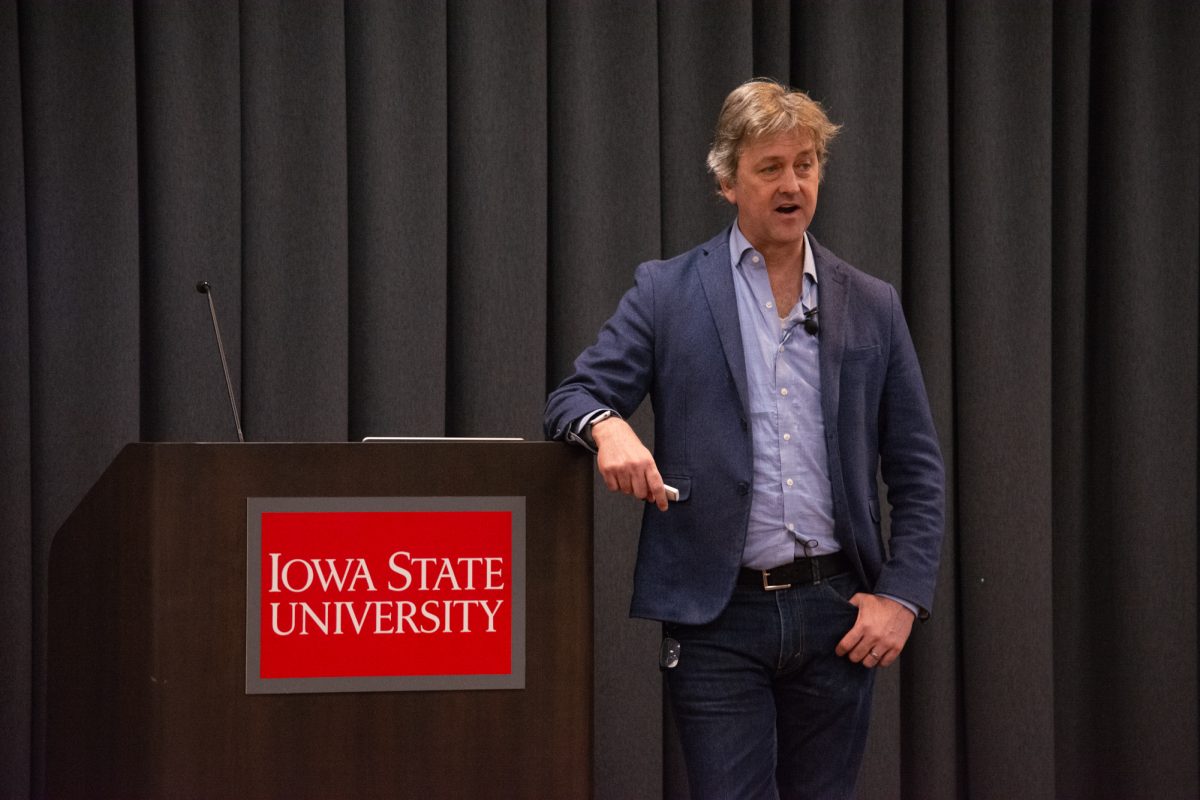- News
- News / Politics And Administration
- News / Politics And Administration / Campus
- News / Politics And Administration / State
Former president of Mexico to deliver lecture at Iowa State, faces mixed reactions
April 17, 2019
Businessman turned politician Vicente Fox, the former president of Mexico, will talk Thursday about the relations between the United States and Mexico in the era of Trump.
Speaking at 8 p.m. in Stephens Auditorium, Fox is being brought to Iowa State as part of the “U.S. Role Abroad and the National Affairs Series: Building a Better Democracy.” Fox served as the president of Mexico from 2000 to 2006.
Fox’s visit has not been without controversy, however. Some Latinx activists in Iowa have taken issue with university’s decision to bring in Fox due to concerns of human rights violations that were committed over the course of Fox’s tenure.
A change.org petition started by Latinx Immigrants for Iowa, an organization that aims to “empower, unite and educate the Latinx immigrant community in Iowa,” that has more than 330 signatures as of Wednesday evening features an image that reads “Stop Vicente Fox.”
Manuel Gálvez, owner and publisher of El Trueque — a Latino magazine in Iowa — has been working with Latinx Immigrants of Iowa and said he does not support Fox’s lecture.
Gálvez said he is concerned that American attendees may not know about the full scope of the types of alleged human rights violations attached to Fox’s presidency.
“Do you think the students and the attendees of this event, do you think they are going to know about these human rights issues?” Gálvez said. “Probably not.”
Mexico was found responsible in 2018 by the InterAmerican Court of Human Rights for sexual violence committed in May 2006 against 11 women during a raid by state police. These women were from an area near Mexico City called Atenco. Fox was president at the time.
Many Anglo-Americans, Gálvez said, only know Fox for his disruption of the 70 rule of the Institutional Revolutionary Party (PRI) and his vocal stance against the Trump administration’s immigration policies.
Fox, Gálvez said, is not considered welcome by what he believes is a majority of the Iowa Latinx community.
Amanda Knief, director of the lectures program, said that while she was not initially aware of the human rights violations associated with Fox when he was first being added to the lectures series, she still believes he will give Iowa State and nearby community members an important opportunity to learn more about Mexican politics and its relationship with U.S. policy.
“Bringing Mr. Fox to Iowa State provides Iowa State students and our community with the opportunity to learn about Mexican politics, [and] about a time during Mexican history when most of the students were very young, so they probably weren’t aware of what was going on in Mexico at the time,” Knief said.
Knief said she did not want anyone to think that Iowa State’s invitation to Fox was condoning or trivializing the suffering or abuse that occured. Instead, the lecture serves as an opportunity for the Iowa State community to learn about U.S.-Mexico relations.
As president, Fox’s early term was characterized by increasing bilateral cooperation between the United States and Mexico to reduce drug trafficking and undocumented immigration, according to the Encyclopedia Britannica. However, Fox’s closeness with the U.S. government was met with some criticism from the Mexican Senate who blocked a planned visit between Fox and United States leaders in 2002.
This attitude toward the United States is in stark contrast to Fox’s recent interaction with U.S. leaders.
Amy Erica Smith, assistant professor of political science, said that historically Fox and George W. Bush had a partnership, as they were elected at roughly the same time and shared relatively similar political ideologies.
Smith said that after Fox, U.S and Mexican presidents maintained similarly positive relationships and Mexico’s economy benefited from its U.S. ties.
“If you’re thinking just about what American policy is toward Mexico, not what Mexican policy is towards the U.S., I would say the two Bushes, [Bill] Clinton and [Barack] Obama were all very similar,” Smith said. “I would say all four of those presidents were committed to promoting free trade with Mexico and to trying to have a relationship that was amicable … in terms of partnership.”
Smith said encouraging legal immigration while discouraging illegal immigration was also a consistent policy among these presidencies.
Smith said Mexican presidents have been careful to try to not provoke Trump. Newly elected president, Andrés Manuel López Obrador, was expected to take an antagonistic role with Trump.
“I think it’s a testament to how strong the incentive is for Mexican presidents to try to get along well with the U.S. president,” Smith said. “In terms of the economic and material incentives to Mexican presidents, they really need to get along well with American presidents.The same cannot be said on Trump’s side.”
Smith said with Trump launching his campaign on the statement that Mexican immigrants were dangerous, his rhetoric surrounding building a border wall and his assertion that Mexico would support and pay for it was a drastic shift in the way U.S. spoke about the Mexican Government and people.
“We are not paying for that f—-n’ wall,” Fox told CNBC. “We are offended. We’re really offended. We don’t like what he has said about Mexico and Mexicans. Every Mexican is now very clear that we must fight, we must resist. That he will go away one day, I hope soon. And that Mexico’s much more than this relationship. We are not the little guy on the backyard.”
If people have issues with Fox’s administration, actions or things he said, Knief said the Q&A would be an opportunity for attendees to ask about those types of topics.
“I hope bringing Mr. Fox here allows for them to raise issues that we otherwise wouldn’t know about,” Knief said.
For Joe Henry, president of the League of United Latin Americans Council 306, he said he believes Fox offers valuable, direct information about the government in Mexico and his perspective on current relations between the United States and Mexico under Trump.
He said he believes Fox’s lecture offers an important chance to hear a perspective that may not be commonly heard by Iowa State students.
“Too little information comes through the pipelines in the United States about what’s going on in Mexico and Latin America as a whole, especially what’s happened in Central America in the last 40 years,” Henry said.
Henry, an Iowa State alumnus, said he believed Iowa State students — both his time at the university and now — have fought for social justice issues, and encouraged anyone who had issues with Fox to not be afraid to ask tough questions during the question and answer segment.
“It’s good to have a dialogue … regardless of some of [Fox’s] history, it’s important to have that discussion,” Henry said.
José Borunda, a junior in agricultural business, said that as someone who lived in Mexico during Fox’s presidency, he did not support Fox’s invitation to speak.
“I think it was very irresponsible for Iowa State to bring him to campus,” Borunda said.
Borunda said while Fox’s ability to bring a perspective that Iowa State community members may not normally be able to hear is positive, he said he feels someone other than Fox should have been chosen.
“They’re not giving [a platform] to someone that’s adequate or a qualified candidate, that’s what’s frustrating to me,” Borunda said. “There’s only a handful of Mexican students that actually lived through his presidency and none of us agree with it.”






